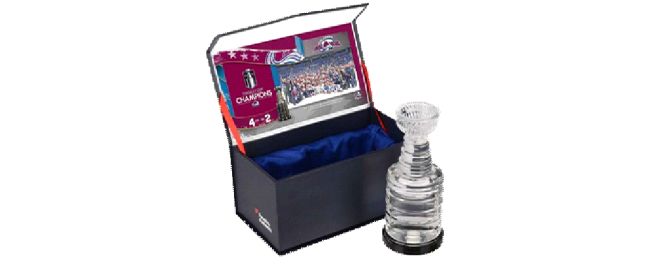Hockey Memorabilia Maker's Infringement Lawsuit against Competitor Melts Away
William Grondin ("Grondin" or "Plaintiff"), a creator and seller of hockey memorabilia, recently found himself iced out of the scope of copyright protection in his infringement claim against Fanatics, Inc. ("Fanatics" or "Defendant") over competing puck-shaped memorabilia incorporating melted ice gathered from championship hockey matches. Kicking Grondin's claims out of the crease, a Pennsylvania district court ruled that Plaintiff could not copyright the idea of storing game rink ice in a piece of memorabilia—only his particular expression of that idea—and the hockey puck-shape expression of the idea is so "commonplace in the world of hockey memorabilia that it alone cannot establish the necessary similarity between the two works to make a viable infringement claim." (Grondin v. Fanatics, Inc., No. 22-1946 (E.D. Pa. Jan. 10, 2023)).
Back in 1998, Grondin scored a copyright registration for his limited edition hockey puck-shaped "Slice of the Ice" collectibles infused with melted rink ice gathered from championship hockey games (Copyright Registration Number VA0000723553). Since then, Grondin claims to have sold his collectibles throughout the United States for decades. More recently, sporting goods and memorabilia manufacturer and retailer Fanatics began selling its own line of rink ice-filled crystal pucks, along with certificates of authenticity (a feature that Plaintiff claims mimics his own Slice of the Ice product).

[Fanatics Authentic 2023 NHL Winter Classic Crystal Puck Filled with Game-Used Ice, from fanatics.com]

["Slice of the Ice" puck, from eBay]
In May 2022, Grondin filed a complaint (later amended in August 2022) alleging that Fanatics infringed upon his copyrighted work. In his amended complaint, Plaintiff alleged that Fanatics produced, without authorization or license, its own ice-filled pucks that were substantially similar to and infringed upon his own Slice of the Ice pucks from memorable hockey games ("Defendant has further imitated Plaintiff by storing the melted rink ice in precisely the same manner as Plaintiff, inside a sealed hockey-puck-shaped cavity"). The complaint asserts one copyright infringement claim and requests monetary damages and injunctive relief that would bar Fanatics from manufacturing and selling the allegedly infringing products.
In August 2022, Fanatics responded with its own one-timer, filing a motion to dismiss the amended complaint. And, in a face-off in a Pennsylvania district court, Fanatics emerged victorious. (Grondin v. Fanatics, Inc., No. 22-1946 (E.D. Pa. Filed May 18, 2022).
As the Pennsylvania court stated, a copyright infringement claim has two elements. First, a plaintiff must allege ownership of a valid copyright. Under the liberal standard of review applied to motions to dismiss, the court ruled in Grondin's favor on this first element. The second element, which requires a plaintiff to allege that the defendant copied original, protectable elements of his work, warranted more attention.
This second element is further broken down into two components: (1) copying and (2) material appropriation. To meet the requirements of the copying component, which focuses on how similar two works are and whether the defendant used the plaintiff's work to create its own, Grondin had to successfully allege either that Fanatics directly copied his work or that copying can be inferred based on similarities between Grondin's "Slice of the Ice" pucks and Fanatics' crystal pucks.
In essence, in its substantial similarity inquiry, the court examined whether Grondin's Slice of the Ice and Fanatics' competing products are substantially similar enough that the lay observer would believe the Defendant copied protectable aspects of the plaintiff's copyrighted work. Ordinarily, such a question of fact is better suited for assessment by a jury, but the court noted that the Plaintiff's infringement claim could be decided as a matter of law, given that the allegedly similar elements are so common or inherent to the underlying ideas being expressed that copying of someone else's works cannot be inferred.
The common copyright axiom states that only particular expressions of ideas, not ideas themselves, enjoy copyright protection. So, as the court stated, the idea of filling hockey memorabilia with melted ice is not protectable, but the expression of pouring rink ice into a hockey puck-shaped piece may be. While it is true that the hockey puck shape is not an inevitable expression of infusing memorabilia with ice—Fanatics itself pours ice into Stanley Cup replicas and snow globes as well—nonetheless, the court found that a hockey puck design flows predictably from the general idea of creating hockey memorabilia ("In other words, a puck is always going to be a puck, an immediately identifiable element in the sport of ice hockey").Therefore, the court ruled, their shared use of hockey puck-shaped elements does not render "A Slice of the Ice" memorabilia and Fanatics' crystal pucks substantially similar under the material appropriation inquiry.
[Below, "Colorado Avalanche Fanatics Authentic 2022 Stanley Cup Champions Crystal Stanley Cup Filled with Game-Used Ice From the 2022 Stanley Cup Final", from fanatics.com]

After the court went on to rule that certain utilitarian features of the Plaintiff's Slice of the Ice memorabilia (e.g., clear, hollow cavities to hold and display melted rink ice) were not protectable under copyright, the horn sounded on this litigation, and the court dismissed the infringement claim.
The court's ruling has had a chilling effect on Grondin's suit, for now. Grondin's infringement claim, however, was dismissed without prejudice, giving Plaintiff the opportunity to amend his complaint to plead actual copying and access or allege other protectable aesthetic or non-utilitarian features in order to establish substantial similarity between his creations and Fanatics' products. Thus, it appears there will be a rematch between these two litigants; on January 24, 2023, Plaintiff filed a motion for leave to file a second amended complaint (a request that was opposed by Fanatics). On February 16, 2023, the court granted Plaintiff's request and a second amended complaint was filed. Not surprisingly, Fanatics shot back with a renewed motion to dismiss, returning this litigation right back to center ice. Stay tuned.
International Swimming Federation Laps Antitrust Suit
A group consisting of swimming world champions and Olympic gold medalists (Thomas Shields, Michael Andrew and Katinka Hosszu) will have to swim against the current if they are to continue their fight against swimming's global governing body, Federation Internationale de Natation ("FINA"). The California district court granted summary judgement to FINA in January, dismissing multiple antitrust claims and a state law tort claim brought by the swimmers and the International Swimming League ("ISL") against FINA, both of which arose from its tactics in dealing with the up-start ISL in 2017-18. (Shields v. Federation Internationale de Natation, No. 18-07393 (N.D. Cal. Jan. 6, 2023)).
FINA (recently rebranded as World Aquatics), first established in 1908 during the Olympic Games in London, is a Swiss organization recognized as the global governing body for aquatic sports, including swimming, and its membership includes 209 national federations. The national federations, by virtue of their membership, agree to comply with FINA rules and enforce FINA rules and penalties against swimmers. FINA sets the qualifying criteria for swimmers to participate in the Olympics and recognizes only qualifying times from competitions held or sanctioned by FINA. Swimmers themselves, however, are not members of FINA and are not required to swim in FINA-sanctioned events exclusively. However, FINA keeps a calendar of and holds its own international competitions, and if member federations also want to hold international competitions on their own or in partnership with independent organizations, they need to seek FINA's approval six months in advance. FINA has no authority over intra-national competitions where swimmers or clubs do not represent a member federation, or international competitions held by independent organizations, without FINA or member federation involvement.
In 2017, a nascent ISL sought to organize international competitions among the world's best swimmers, and structure them as a more traditional sports league. The 2021 iteration of the ISL, for example, featured eight teams of 30 or more swimmers (men and women) competing in various meets in August and September, culminating in playoffs and a championship meet in November and December. ISL initially sought to be a competition officially sanctioned by FINA (which comes with a spot on the FINA calendar alongside events such as the FINA World Championships and allows times to be official for purposes of Olympic qualification and world records). When negotiations with FINA stalled, however, the ISL went to the individual national federations to host their events.
The heart of the complaint was FINA's June 2018 reaction to ISL's negotiations with its member federations. As described by the court, FINA published multiple memoranda reminding affiliated members that "FINA is the only recognized body in the world which governs Aquatics internationally" and allegedly brought up the possibility of suspensions of members that hosted or sanctioned ISL events, causing several federations to cease negotiations with ISL.
Because of the big splash surrounding its formation and its troubles with FINA approval, the swimmers and ISL brought a medley of antitrust claims in December 2018 (later amended) alleging that FINA and its member federations conducted an illegal group boycott of ISL by refusing to cooperate with ISL. (Shields v. Federation Internationale De Natation, No. 18-07393 (N.D. Cal. Amended Complaint Jan. 17, 2020). The thrust of the complaint was that FINA uses its control over Olympic aquatic sports to determine the terms of compensation and competition for international swimming events outside of the Olympic Games and FINA's own competitions, thus engaging in anticompetitive conduct "to maintain its grip on both its monopoly power in the market for top-tier international swimming competitions and its monopsony power in the market for the supply of top-tier swimmers."
In December 2019, the court declined defendant's motion to dismiss, but FINA dove right back in and found more success on summary judgment.
This case marks another in a long line of antitrust cases that highlight the difficulty of applying antitrust laws to the world of sports. As the court stated, in determining the merits of a Sherman Act §1 claim, the court must broadly determine whether there has been an unreasonable restraint of trade. The judge in this case evaluated the §1 claim using a three-element framework, requiring the swimmers and ISL to show "(1) that there was a contract, combination, or conspiracy; (2) that the agreement unreasonably restrained trade under either a per se rule of illegality or a rule of reason analysis; and (3) that the restraint affected interstate commerce." FINA's key victory came during the second leg of that analysis, which determined that a rule of reason analysis was proper rather than a per se rule of illegality.
The swimmers and ISL claimed FINA's actions constituted a "classic group boycott," which is generally considered a per se illegal tactic by which competitors conspire to keep a would-be competitor from the marketplace by depriving them of "a trade relationship which they need in order to enter (or survive in)" the level of the industry wherein the competitors operate. The court pointed out that, while partnering with member federations would make it "easier" for ISL to compete, they were not deprived of any truly fundamental resource. As a practical matter, swimmers may prefer to swim in FINA-sanctioned events so that they can use their times to qualify for the Olympics and world records. An elite swimming competition may prefer to partner with FINA or one of its member federations to attract the most elite swimmers and ensure there are not scheduling conflicts with other events. Nevertheless, as the court stated, these are not necessary for survival, and the ISL does not technically "need to affiliate with member federations to hold its own swimming competitions." Moreover, the court noted that swimmers are not bound to swim exclusively in FINA-sanctioned events, and the ISL can carry out and has carried out top-tier swimming competitions absent affiliations with member federations. Thus, the court determined that FINA and its members' actions did not constitute a classic group boycott and opted to use the more defendant-friendly rule of reason analysis.
The swimmers and the ISL truly belly-flopped once the court turned to its rule of reason analysis. The first step of the court's rule of reason analysis was proving and defining the "relevant market." Defining the relevant market has been one of the most interesting questions in sports antitrust cases throughout the years, as it forces the parties to prove (and the court to consider) what constitutes the "area of effective competition" as applied to a particular sport or league. Query, what would consumers or fans of FINA-sanctioned events consider a substitute? Other elite swimming competitions such as the NCAA Championships? Or must there be an international component? Would any Olympic sport suffice? Would any entertainment product suffice? In the past, some courts have defined the market very narrowly in sports, but the plaintiffs here failed to prove that a relevant market exists. So, the court did not have to consider the complex question of defining the market at all. Instead, the lack of proof of a market sunk any remaining hope of a rule of reason or Sherman Act §2 victory, as the court stated that a relevant market – whether claiming concerted action by multiple parties (Sherman Act §1) or monopolistic action by a single party (Sherman Act §2) – is indispensable to proving an antitrust claim. The court admitted that there was evidence of FINA's "concern" about competition with ISL, but "antitrust laws do not require one competitor to help another compete with it; instead, they prohibit only unreasonable restraints of trade."
In the final length of the opinion, the court granted summary judgment to FINA against the swimmers' state tort claims on jurisdictional grounds.
Their claims sunk, the swimmers have subsequently appealed their case to the Ninth Circuit, hoping the court will do a flip-turn on the standard of review. Meanwhile, there has been no word on whether ISL will also continue to fight, but it does appear that they will be staying in the pool, as they have announced a return for a fourth season after cancelling the 2022 season.
Alterra and Ski Pass Holders Carve Out $20 Million Settlement in Pandemic Closure Class Action
On January 19, 2023, a Colorado district court plowed the way for half a million Alterra Mountain Co. ("Alterra" or "Defendants") ski pass holders ("Plaintiffs") to receive $17.6 million in ski pass credits for breach of contract claims stemming from Alterra's failure to issue refunds for resort closures due to COVID-19. Judge Raymond P. Moore gave final approval to the settlement proposed by both parties. Additionally, after further consideration, on January 27 Judge Moore approved $2.9 million in attorneys' fees and costs. (Goodrich v. Alterra Mountain Co., No. 20-01057 (D. Col. Jan. 27, 2023)).
Defendants offered Ikon Passes (promising nearly "unlimited access" to Alterra's ski resorts during the 2019/20 ski season). The snowball began rolling down the hill on March 15, 2020, when, as a result of the pandemic, Defendants closed its ski resorts in the midst of the 2019/20 ski season. Further, in March 2020 various governmental entities issued stay-at-home orders. Pass holders demanded a refund of paid pass fees, but Defendants publicly announced that they would not be processing any refunds or offering compensation.
Clicking into their bindings, in spring 2020, litigants filed multiple class actions alleging breach of contract and other claims related to early closures of ski resorts and the inability to use Ikon Passes for the full 2019/20 ski season. Eventually, between May and October 2020, twelve actions were consolidated, with Plaintiffs filing a consolidated class action complaint which asserted ten claims for relief. In October 2020, Defendants filed a motion to dismiss contending, among other things, that Defendants never promised a "complete ski season" of a particular length, that "unlimited access" only referred to frequency of access when the resort was open to the public, and that, ultimately, it was the pandemic and government orders that prevented Plaintiffs from skiing after March 15, 2020. The district court dismissed most of the Plaintiffs' claims in a June 2021 order, but allowed the key claim of breach of contract to survive. In particular, Judge Moore wrote "...because the resort closures were based on the pandemic rather than the end of the ski season, Plaintiffs plausibly alleged Defendants failed to perform, or substantially performed, in accordance with the terms of the contract." The court further found that the promise, when read as a whole, was for "unlimited access" during the 2019/20 ski season, rejecting the argument that the date when a ski season ends varies from season to season due to ski conditions (and Defendants' discretion of when to close the resorts for the season).
Following discovery, the parties began settlement negotiation in late October 2021. By June 2022, the parties had executed a binding term sheet, and a deal was signed on August 11, 2022. On August 25, the parties filed a preliminary approval motion for initial approval of the proposed settlement and certification of the settlement class. Under the terms of the $20 million agreement, class members could collect approximately $17.6 million in benefits – either a ski pass credit or a ski lift voucher with a value based on the number of times that they had used their 2019/20 ski passes before the pandemic closure. Members would automatically receive the ski pass credits loaded onto their customer profiles, which could be used toward the purchase of a 2023/24 or 2024/25 pass unless they chose to receive the voucher toward the purchase of a single-day ticket instead. Ski pass credits range in value from $10 (for someone who used an Ikon Pass more than six times) to $150 (for someone who used the pass only once during the 2019/20 season), all based on how much value a skier had gotten out of the Ikon Pass versus the price of a day pass. The lift vouchers, which (notably for those that did not want to ski at an Alterra resort again) could be transferred or sold, would be worth 20% – 50% of the price of a single-day lift ticket depending on how many times the 2019/20 Ikon Pass holder used their pass. As with the pass credits, class members that used their passes the least were eligible to receive a higher-valued voucher. Reports highlight the loyalty of ski pass members, with over 490,000 of the 500,000 class members having chosen to receive pass credits.
In January 2023, Judge Moore approved the settlement amount of $17.6 million for the Plaintiffs and $2.9 million in attorneys' costs and fees, placing the case on the magic carpet to resolution. With the settlement finalized, skiers have likely long forgotten this legal skirmish, seemingly buoyed by snowfalls that have blanketed mountain resorts out West this winter.
Postscript: Following NBA Properties' Landmark Victory in Seventh Circuit, SCOTUS Denied Counterfeit Seller's Petition for Certiorari
As we detailed in the November 2022 issue of Three Point Shot, NBA Properties, Inc. ("NBAP"), the exclusive licensee of the NBA and its teams' distinctive trademarks, along with other major professional sports trademark rightsholder plaintiffs, filed a complaint in December 2020 with an Illinois district court against multiple overseas online retailers, including defendant HANWJH, Inc., a foreign-based online retailer, for trademark infringement and counterfeiting under the Lanham Act. The district court denied HANWJH's motion to dismiss for lack of personal jurisdiction. In August 2022, the Seventh Circuit affirmed, finding that the exercise of specific jurisdiction over HANWJH in Illinois was proper. Months later, in November, HANWJH filed a petition for certiorari with the Supreme Court. However, in January 2023, HANWJH's half-court shot at the buzzer missed the mark when the Court denied the seller's petition for certiorari.
The content of this article is intended to provide a general guide to the subject matter. Specialist advice should be sought about your specific circumstances.















